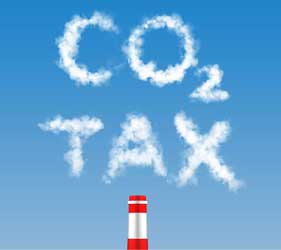The most effective policy instrument to tackle the negative effect of carbon emissions is to levy a tax on the carbon footprint of businesses and consumers.
However, when it comes to reaching a global agreement on a carbon tax, it is no secret that progress has yet to be discovered. Rather than waiting for the world to come together, some countries, such as Sweden, Chile and Australia, have introduced their own carbon-pricing schemes. Still, many governments are weary of such unilateral approaches. They worry about the industry moving elsewhere without solving the global climate emergency.
In new research by Southern Methodist University, the University of Chicago and the University of Bologna, we argue that this reluctance to go it alone ignores how unilateral carbon taxes interact with the forces that shape the world’s economic geography. Once these forces are brought into the picture, we find that a unilateral carbon tax of $40 per ton of carbon dioxide introduced by the United States or the European Union would expand these economies and improve global well-being.
To reach this conclusion, we developed a high-resolution model of the world economy. In this model, a carbon tax not only mitigates future warming but also affects the distribution of economic activity across the globe. But if so, wouldn’t we expect the economy introducing the carbon tax to lose? After all, a carbon tax makes it more expensive to conduct business for the region that introduces that tax. As such, wouldn’t the economy of the United States or the European Union shrink after implementing a carbon tax, and wouldn’t this be costly for the world today?
This negative view of carbon taxes would be correct if we ignored the revenues generated by these taxes. Businesses in the United States or the European Union would face a higher tax burden. There would be downward pressure on wages to remain competitive, and local income would drop.
But what happens if governments rebate the carbon tax revenue to the locations that paid them? As long as local wages are not too sensitive to an increase in energy price, such local rebating will increase local income more in areas that specialize in energy-intensive sectors. Though seemingly counterintuitive, the logic for this result is straightforward. The carbon tax burden is partly passed on to the final consumer. With many consumers residing elsewhere, a larger part of the tax is de facto paid by foreign consumers.
In contrast, the tax revenue is integrally rebated locally. This bumps local income and more so in places specializing in energy-intensive industries. Non-agriculture emits more carbon than agriculture, so those locations mainly produce non-agricultural goods.
With non-agriculture being particularly productive, this unilateral carbon tax will benefit the most productive areas of the United States or the EU and incentivize migration from the rest of the world.
With more people moving to the most productive areas, the global economy becomes more efficient. At its heart, a unilateral carbon tax with local rebating of revenue introduced by either the United States or the European Union acts as a subsidy to some of the world’s most productive areas. As this attracts people to move there, not only does the local economy expand but there are global gains from a more efficient distribution of economic activity.
Regarding carbon taxes, policymakers worry about deindustrialization and highly productive industries moving elsewhere. They also worry about a policy that promises future gains at the expense of the current generation that bears the cost of higher taxes.
Our research reveals that both concerns are misplaced. A modest unilateral carbon tax expands the local economy, especially in the highly productive industrial sector. And it has positive effects on the global economy, not just in the future but upon impact.
It is time for policymakers to have a fresh look at the benefits of unilateral carbon taxes. There is no longer a reason to wait for the world to reach a global agreement on carbon pricing.
Bruno Conte is an economics professor at the University of Bologna; Klaus Desmet is an economics professor at SMU Dallas; and Esteban Rossi-Hansberg is an economics professor at the University of Chicago. Their most recent research examined how unilateral carbon taxes affect the global economy.


